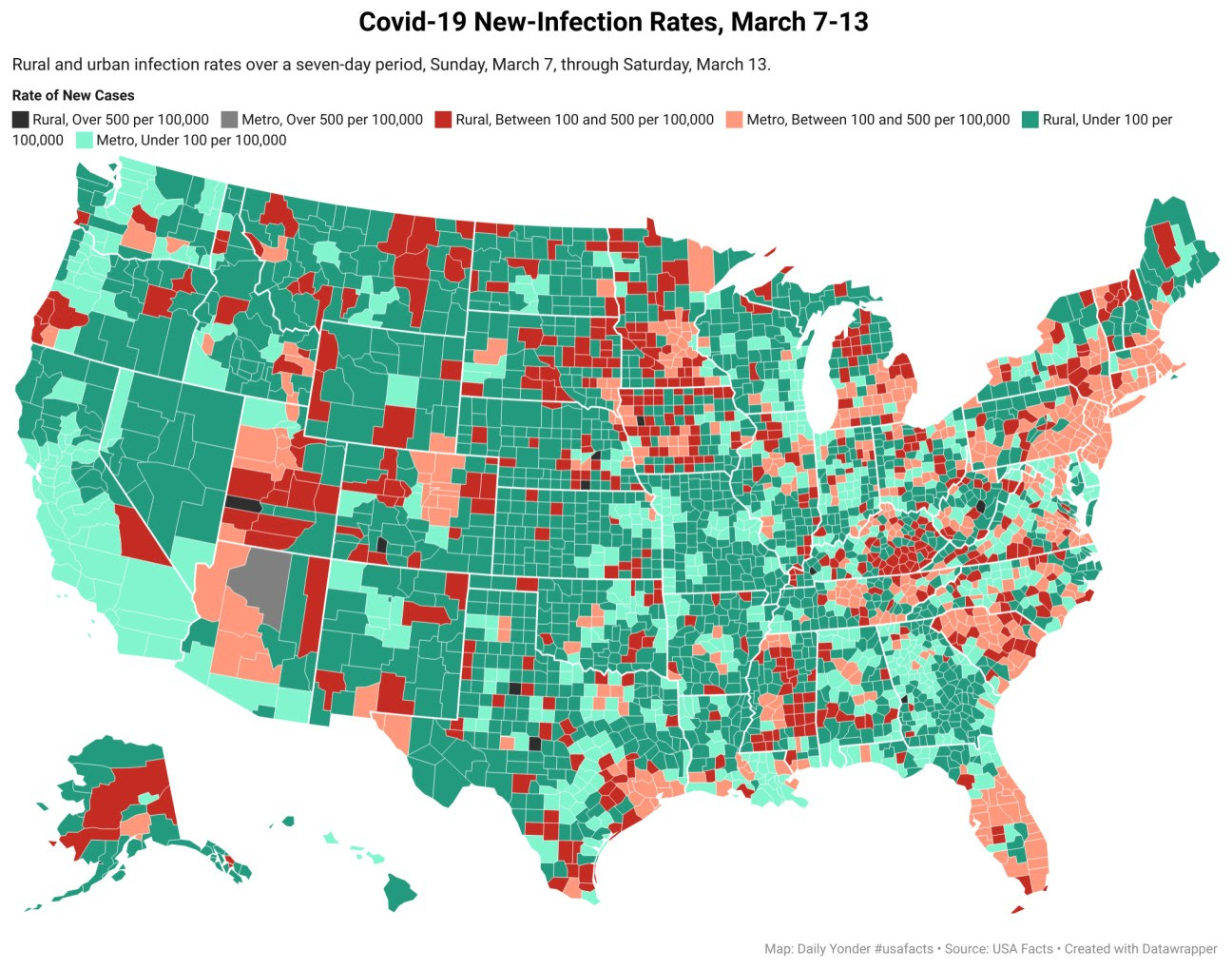- Colorectal Cancer Is Rising among Younger Adults. Some States Want to Boost Awareness.
- Rural Hospitals Built During Baby Boom Now Face Baby Bust
- Food Stamps Go Further in Rural Areas — Until You Add Transportation Costs
- CMS Announces Resources and Flexibilities to Assist with the Public Health Emergency in the State of Texas
- CMS Proposes New Payments for Digital Health Under CY2025 PFS Draft Rule
- Improving Public Health by Strengthening Community Infrastructure
- Biden Harris Administration Proposes Policies to Reduce Maternal Mortality, Advance Health Equity, and Support Underserved Communities
- Nearly Half of U.S. Counties Don't Have a Single Cardiologist
- Randolph County, Ill. Turns Unused Part of Nursing Home Into State-Of-The-Art Behavioral Health Center
- Safe and Stable Housing Is a Foundation of Successful Recovery
- Rural RPM Program Is a Lifeline for Pregnant Women
- Expert: Rural Hospitals Are Particularly Vulnerable to Increasing Cyberattacks Targeting Healthcare Facilities
- Biden-Harris Administration Invests Over $200 Million to Help Primary Care Doctors, Nurses, and Other Health Care Providers Improve Care for Older Adults
- AJPH Call for Papers Special Section on Intersections of Public Health And Primary Care
- NIH HEAL Initiative Turns Attention to Pragmatic Trials in Rural Communities
SAMHSA Training and Technical Assistance Related to COVID-19
The Substance Abuse and Mental Health Services Administration (SAMHSA) created this list of resources, tools, and trainings for behavioral health and recovery providers.
Rural Response to Coronavirus Disease 2019
The Rural Health Information Hub has a compendium of rural-specific activities and guidelines, including Rural Healthcare Surge Readiness, a tool with resources for responding to a local surge in cases.
ATTC Network COVID-19 Resources for Addictions Treatment
The Addiction Technology Transfer Center (ATTC) Network was established in 1993 by the Substance Abuse and Mental Health Services Administration. The online catalog of COVID-related resources includes regularly-updated guidance and trainings for professionals in the field.
COVID-19 Resources from the Federal Transit Administration (FTA)
The agency that assists local transit authorities includes several rural examples in its list of initiatives across the country to get residents to vaccination sites. FTA’s National Center for Mobility Management also has a webinar series specific to pandemic efforts and other resources for planning transit.
Studies: Rural Americans Less Likely to Follow Some Covid-19 Prevention Measures, Get Vaccines

By Liz Carey
But researchers agree that finding the right spokespeople for the prevention protocols and vaccines could change minds and make a difference.
Read more
New Rural Infections Drop to Lowest Number since July; Deaths Also Decline

By Tim Murphy and Tim Marema
New rural cases have fallen by 80% since January. Deaths are down by two-thirds during the same period.
Read more

CDC Ebola Clinical Alert
A recent HealthLeaders article discusses the Centers for Disease Control and Prevention (CDC) “Ebola Clinical Alert for U.S. Healthcare Personnel” and is recommending that all U.S. healthcare settings should ask about international travel while screening patients and visitors for signs and symptoms of COVID-19. As of March 4, airlines are also required to collect and transmit contact information to the CDC for “appropriate public health follow-up and intervention for all passengers boarding a flight to the U.S. who were in the Dominical Republic of the Congo or the Republic of Guinea within 21 days before their arrival in the U.S. International travel histories are to alert healthcare personnel to the possibility of other communicable infections, such a viral hemorrhagic fever, that need specific infection control precautions and/or treatments.
Health Alert on Multisystem Inflammatory Syndrome in Adults
The Pennsylvania Department of Health a new Health Alert: 557 – 3/9/21 – ADV – Call for Cases: Multisystem Inflammatory Syndrome in Adults (MIS-A). Multisystem inflammatory syndrome in children (MIS-C) is a rare but severe complication in children and young adults infected with SARS-CoV-2, the virus that causes COVID-19. Since June 2020, several case reports describe a similar multisystem inflammatory syndrome in adults (MIS-A). Healthcare providers should report suspect cases of MIS-A by faxing the attached case report form to 717-772-6975 or your local health department or by emailing the form to ra-dhCOVIDcontact@pa.gov. Click here for the entire health advisory and case report form.
Pennsylvania Explores Centralized Vaccine Scheduling System
A member of Pennsylvania’s COVID-19 vaccine task force says the group and the state are exploring the idea of a new system to make it easier for people to schedule a COVID-19 vaccination appointment. Read more.
CDC Issues First Set of Guidelines on How Fully Vaccinated People Can Visit Safely with Others
The Centers for Disease Control and Prevention (CDC) issued its first set of recommendations on activities that people who are fully vaccinated against COVID-19 can safely resume. The new guidance, based on the latest science, includes recommendations for how and when a fully vaccinated individual can visit with other people who are fully vaccinated and with other people who are not vaccinated. This guidance represents a first step toward returning to everyday activities in our communities. CDC will update these recommendations as more people are vaccinated, rates of COVID-19 in the community change, and additional scientific evidence becomes available. While the new guidance is a positive step, most people need to be fully vaccinated before COVID-19 precautions can be lifted broadly. Until then, it is important that everyone continues to adhere to public health mitigation measures to protect the large number of people who remain unvaccinated. CDC has released resources to help people make informed decisions when they are fully vaccinated.
